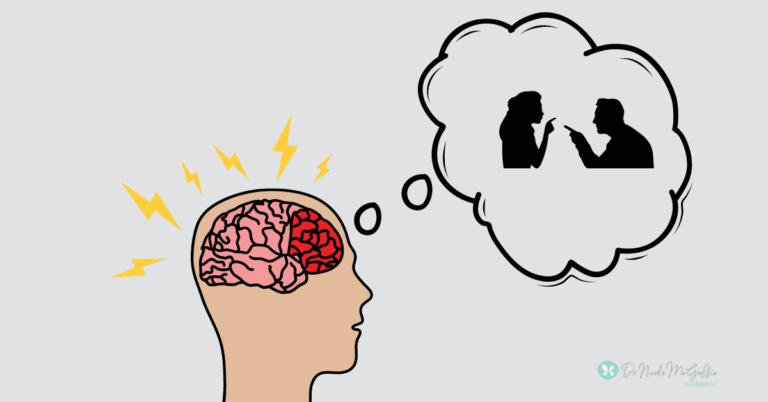We all want to be loved and sometimes, red flags in a relationship can be easy to ignore. Naturally, we want to feel that special connection with someone else. And while love is beautiful, sometimes it can be toxic.
There’s no denying it – relationships are hard.
They take work. They require communication, mutuality, a hefty dose of emotional safety, and a whole lot of love. Sometimes, despite all of the effort, relationships can become toxic. And if you’re in one of those relationships, it can be challenging to know how to turn things around or walk away.
In many cases, toxic relationships don’t start out that way. They may begin as something wonderful and then, over time, morph into something that feels increasingly harmful.
What is an unhealthy relationship?
An unhealthy relationship is one that doesn’t support your overall well-being. It might feel fine most of the time, but there are specific behaviors or patterns that make you feel bad about yourself, leave you feeling drained or unhappy, or even cause physical problems.
There are a number of things that can contribute to toxic relationships:
- One person is overly dependent on the other
- There’s a lack of communication
- One person is always putting the other down
- There’s a lot of drama and conflict
- One person is always trying to control the other
- There’s emotional or physical abuse
These are just a few examples, but if you’re experiencing any of these red flags in your relationship, it’s important to take action. Toxic relationships can have serious consequences on your mental and physical health. They can also lead to cycles of abuse that can be difficult to break out of.
An unhealthy relationship can entail the obvious such as abuse, betrayal, or infidelity. However, what defines an unhealthy relationship is that it lacks secure functioning, which entails emotional safety, security, mutuality, fairness, and justice.
There is zero abuse, betrayal, or infidelity in a securely functioning relationship.
If you don’t feel like your partner has your best interests in mind, your relationship might be two people doing their lives side by side, not together. Dr. Stan Tatkin, the founder of PACT therapy, states, “secure functioning in a relationship, means that two people, decide that they are going to be fully collaborative, cooperative, fair, just, and sensitive. In other words, we expect two-person systems to operate as a two-person psychological system based on those principles.” – Stan Tatkin
What does it mean to be in an unhealthy relationship?
Being in an unhealthy relationship means your relationship is lacking security and secure functioning. And this can be difficult because while you are wired to be in a relationship, you are also wired to keep yourself safe from danger.
The nervous system and brain mechanisms that keep you safe can wreak havoc on relationships. Your brain and body can be contradictory- trying to save your relationship while also trying to protect yourself.
Do you find that sometimes you lash out or withdraw in order to create distance because you don’t feel safe? This is a natural survival mechanism, but it can also damage relationships.
Your brain is constantly trying to assess if your environment is safe. And when it doesn’t feel safe, it can send out alarms that tell you to get away from the source of danger- even if that source is your partner.

This can create a cycle of fight, flight, or freeze in relationships that is difficult to break out of. But it’s important to understand that this is not your fault.
You may be triggered by a situation in your relationship. When triggered, stored implicit memories can then be projected onto your partner. You don’t see the situation clearly because your memory is fallible. These are major red flags.
To protect your ego, your brain can manifest reasons for why a conflict is happening that may not actually be accurate.
For example, you might get into an argument with your partner and instead of seeing that the conflict is about the issue at hand, your brain might tell you that it’s because your partner doesn’t care about you. This can lead to toxic patterns of behavior in relationships.
Furthermore, you may believe you are communicating clearly, but this is probably not the case when you’re stressed. When you’re feeling threatened, your brain can send out survival signals that distort your perception and lead you to act in ways that are not logical. But again, this is not your fault. It’s just how the brain works.
Being in an unhealthy relationship can also look like being in a one-sided relationship. In a healthy relationship, both partners should feel like they are being seen, heard, and valued.
When these mechanisms are at play in a relationship without secure functioning, it can feel like the relationship is getting toxic. Just being around your partner can trigger a bodily response of increased heart rate, feelings of dread, and feeling alone in the relationship. This is what it means to be in an unhealthy relationship.
We’ve all heard the phrase, “love is blind.” And unfortunately, that seems to be true for many people who stay in toxic and abusive relationships. They are in denial about their partner’s toxic behavior because they are afraid of being alone or they believe their partner will change.
If you find yourself making excuses for your partner’s behavior or downplaying how bad it really is, that’s a red flag that you’re in an unhealthy relationship.
1) Defensiveness in your relationship
Defensiveness in relationships is so common it may feel normal to have it occur in your relationship. However, according to Arlin Cuncic, defending or protecting is used to distract from feeling hurt or shame. When one partner is defensive, the attention shifts to “the faults of the other person, so you feel better about yourself.”
Cuncic defines defensiveness as:
- no longer listening
- making excuses
- blaming the other
- accusing the other
- justifying your actions
- and telling the other person they shouldn’t feel that way
When defensiveness is happening… understanding, validation, repair, and relief are not.
2) Devaluing comments
When you are in a relationship with someone, you should feel like an equal. If your partner regularly makes jokes that demean you or puts you down, that’s a sign of an unhealthy relationship.
Even if they say they’re just joking, these comments can eat away at your self-esteem and make you question your worth.
Devaluing comments include:
- Passive-aggressive statements.
- Changing your words, subtle insults.
- Sarcasm.
- Name-calling.
- Your reality is altered by your partner doing something and then denying it. Also known as gaslighting.
While this is not okay, not creating clear mutually agreed-upon guard rails to stop this is also unhealthy.
3) Under-functioning in your relationship
When issues arise in your relationship, do you stay quiet to keep the peace? Do you avoid conflict or believe you can’t do anything about it when there is conflict?
You are under-functioning if when mistreated in your relationship, you don’t do anything about it. Because you can’t face the potential of loss of the relationship, you end up taking scraps and pieces of what a healthy relationship should be.
Under-functioning is when you are not accessing your agency to be an equal partner and it severely disrupts the attachment of the relationship.
Over time, resentment will build, and the upset will come out. How do you fix this? You can learn how to argue productively and move the ball forward, so each partner feels understood, validated, and gets their needs met.
However, many people don’t know how to argue productively, and they get stuck in the content of what happened.
4) Arguing over what happened instead of how to fix it
Arguing over what happened is a futile exercise. Memory is fallible; we all have different brains, nervous systems, experiences, psychologies, and biology. Two people may go through the same event and remember it differently.
Getting in the loop of who is right and wrong in the relationships gets you stuck in blame and keeps you from solving the problem together. This can quickly turn into feeling attacked and then firing back to protect yourself. In this dynamic, each person is protecting themselves and hurting their partner.

5) Not protecting your partner in public and private
You should feel proud of your partner and have their back. When you air out a complaint of your partner in front of others, this is a form of not protecting them. The goal is to feel safe to speak about your relationship struggles with your partner, not everyone else.
In private, communicating in a way that puts your partner down (name-calling, threats, criticizing, etc.) is not okay. This will lead to a feeling of being unsafe and unprotected in the relationship. Stan Tatkin asserts protecting your partner in public and private is a criterion for secure functioning relationships.
Without emotional safety coming from feeling protected as a shared principle in operating the relationship, over time, you will feel as if your energy is drained, higher stress levels, and lower availability to go into the world ready to take it on.
6) Contempt
Contempt is a cocktail of judgment and anger that takes away safety. It can make you feel superior to other people or things. It is toxic to a relationship and can quickly escalate to name-calling, stonewalling, or physical violence.
Contemptuous people:
- Make fun of their partner’s appearance.
- Use pet names as an insult. (“You’re such a idiot.” “Shut up, you babbling idiots.”)
- Roll their eyes. (This is considered the nonverbal equivalent of contempt.)
- Sneer.
- Behave condescendingly.
- Make toxic assumptions about their partner’s intentions (“You’re just doing that to make me mad.”)
- Use sarcasm as a put-down.
Psychologists Gottman and Gottman describe communicating in this state as being “truly mean, treating others with disrespect, mocking them with sarcasm, ridicule, calling them names, and using body language such as eye-rolling or scoffing. The target of the contempt is made to feel despised and worthless.”
Contempt may even be a part of a more significant pattern called intermittent reinforcement. As the greatest predictor of divorce, contempt in relationships also weakens the immune system!
So, if you’re feeling superior to your partner, it might be time to check yourself and see if this is something you’re projecting in the relationship.
7) Inability to apologize
Part of being in a relationship is apologizing when you’ve done something wrong. It’s acknowledging the pain you’ve caused your partner, taking responsibility for your actions, and making reparations.
When you can’t apologize, it creates an emotional distance in the relationship and chips away at trust and emotional safety. If this is something you struggle with, it may be helpful to explore the roots of your resistance to apologizing.
8) Unable to resolve who was more wronged
If one of the patterns in your relationship is a stalemate of who is more aggrieved and, therefore, who is to blame and fix it, you have a serious problem. This red relationship flag keeps couples stuck, and both are invalidating the experience of the other – fighting over content, blaming, and waiting for the other to change.
It is important to note that if one or both people keep blaming their partner for everything, they will never move forward. If you find yourself in this position, it means your relationship has problems and needs immediate attention before things deteriorate further. This also indicates your relationship is not working on solving issues mutually.
9) Withdrawal or isolation from support
When people are in toxic relationships, they tend to isolate themselves from others. This includes friends, family, and any type of social support. They may do this because they’re embarrassed about the state of their relationship or because their partner has threatened them if they reach out for help.
Isolation will typically occur if your partner is:
- Trying to control who you see and talk to.
- Jealous of your time spent with others.
- Asking you to cut off communication with certain people.
- Gets angry when you don’t include them in everything you do.
- Wants to know where you are all the time.
- These are all toxic behaviors that should not be tolerated in any relationship.
10) Stonewalling your partner
Gottman and Gottman describe stonewalling as a relationship red flag. Usually used as a direct response to contempt, stonewalling occurs when “the listener withdraws from interaction, shuts down, and stops responding to their partner.”
Instead of facing problems with their partner, those who stonewall may tune out, walk away, act busy, or engage in distracting or obsessive behaviors.
This way of coping can turn into a bad habit leaving you and your partner physiologically flooded with negativity. If you find yourself stonewalling, it’s important to a break, calm down, and then come back to the conversation when you’re both in a better place.
11) Being unwilling to apologize take
Not being willing to apologize is a massive issue if this is what is happening in your relationship. People will have misunderstandings and mis-attunements, but the issue is when there is an unwillingness to apologize. If you are unable to do this, it will only further tear the relationship apart.
The problem is when couples get into a stalemate of one person needing repair and the other believing they are right and therefore does not need to apologize. If one is aggrieved, the other needs to apologize.
When is the apology effective? When the aggrieved party has decided it’s effective, their nervous system finds safety again. If you’re unable to apologize, it creates an emotional distance in the relationship and chips away at trust and emotional safety.

How to Recognize the Early Warning Signs of an Unhealthy Relationship
A lack of secure functioning in your relationship feels terrible. You may find yourself arguing in circles about inconsequential material. You may find yourself not feeling like you are emotionally safe enough to relax.
You may find yourself in a codependent dynamic; trying to fix things one directionally, doing everything you can to make it work but not actually getting anywhere.
- Listen to your body. Your brain will lie, but your body will not. Do you feel dysregulated when you are with your partner? How does your relationship with your partner affect your general wellness? Your sleep? Your dreams? Your eating habits?
- Do you feel like you can be genuine, and authentic, and that you both validate and relieve each other. Or do you feel stuck in a negative communication cycle of arguing and not getting anywhere?
- Do you feel like you can speak up about your concerns, or that if you do, it will get you both in a never-ending fight?
- Do you find yourself using substances to cope with your relationship?
- Do you feel alone in the relationship?
What should you do if your relationship is unhealthy?
If your relationship is unhealthy, you and your partner can learn healthier ways of relating to each other. The fastest and most effective way to do this is through therapy.
Couples therapy can help you and your partner learn how to communicate with each other more effectively, understand and manage conflict in a healthy way, and develop a more positive and supportive relationship.
You most likely entered the relationship with the best intentions of loving your partner and being loved. However, if you grew up in homes where you experienced insecure functioning in your parents’ relationships and insecure attachment (avoidant, anxious, or disorganized) you may repeat these patterns without knowing.
We are attracted to people that feel familiar with our early experiences and implicit memories. And, we tend to replay and project these dynamics onto our partner.
The reason you are struggling may not be what you first assume. And, you and your partner can learn how to operate in secure functioning so you both can feel safe, secure, and more in love again.
Can Therapy Fix a Toxic Partner?
Yes, therapy can fix a toxic partner. What’s called for is a change in the way we think about relationships. There is an understanding among therapists that partners architect a healthy or unhealthy relationship in ways that may be out of their consciousness.
To build a healthy relationship, agreements about your principles and guardrails need to create an interdependent relationship. There is a dependency on each other for protection, safety, security, and trust. If this is not happening, it’s a major red flag, and one would question why you are in the relationship.
If someone is concerned about losing their autonomy, being controlled, or being enmeshed, they are likely responding to early relationship dynamics with their parents that did these things to them.
They may not even be aware that this was done to them.
They will tend to repeat these dynamics and blame their partner for everything. When it’s repeated again and again, the threat becomes part of the psychobiological process.
How Do You Leave an Unhealthy Relationship?
These red flags can help determine if your relationship needs some reorganization in how you and your partner are working together so ultimately you both enjoy the fruits of a healthy relationship.
However, if you decide that you want to end the relationship, there are techniques you can use to do it safely and minimize harm to both of you.
- Get straight to the point, don’t go into long explanations
- Use non-violent communication; 1) state the facts 2) state your feelings, 3) state your needs 4) make your request (in this case you would share that you are breaking up)
- Be willing to listen to your partner’s experience
- If co-parenting is involved, ask to learn together how to co-parent with secure functioning principles together to protect the kids.
Signs of a Toxic Relationship
Toxic relationships are characterized by patterns of violence, manipulation, and control. If you’re in a toxic relationship, you may feel like you’re walking on eggshells, always worried about saying or doing something that will cause a fight. You may feel like you’re being controlled, or like you have to put your partner’s needs above your own.
Toxic relationships can be damaging to your mental and physical health, and can even lead to death. If you’re in a toxic relationship, it’s important to get help from a therapist or counselor and to take steps to protect yourself.
You deserve to be in a safe, healthy relationship.
If you’d like to learn more about PACT and creating a healthy relationship, learn more about PACT couples therapy and see if it’s right for you.



